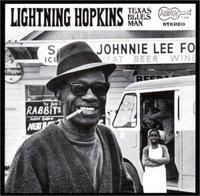No, it shouldn’t. And there’s hope. With such notable tastemakers as Banjo Jones and John Nova Lomax endorsing the idea, the momentum is building. It’s only a matter of months, if not weeks, before the Houston Chronicle editorial board hoists itself aboard the late train and gets behind Lightnin’ Hopkins Park.
Surely Billy Gibbons, who became a jillionaire appropriating the vocal mannerisms and guitar stylings of elderly black men, would appreciate the justice of such a gesture.
(Gibbons figures in that most telling but possibly apocryphal of Lightnin’ Hopkins anecdotes: As a member of the pre-Top Moving Sidewalks [99th Floor---best song he ever had a hand in, outside of Francine, of course], the young Gibbons, after catching Hopkins at a local venue in the late ’60s, supposedly remarked that Hopkins didn’t even know when to change chords, or something to that effect. Hopkins overheard and set the smirky Tanglewood native straight: “Lightnin’ change when Lightnin’ want to.” If that story’s not true, it should be.)
So we’re hoping that Gibbons might take up the flag and wheel himself before the Houston Downtown Park Conservancy directors or the city council or even the Chronicle editorial board to pitch for Lightnin' Hopkins Park.
With Gibbons walking point, could Carolyn “Doc” Farb be far behind? And Sheila Jackson Lee only a little farther?
It’s not a vote, however---it’s a contest, so if Gibbons has Internet access he could go here and register his entry for Lightnin' Hopkins Park (Lightning Hopkins Park would be fine, too.)
Then, if the three people who read this blog go here and also submit their entries for Lightnin’ Hopkins Park, and contact their three friends and urge them to do the same, and those three friends contact their three friends, and those three friends … perhaps the Downtown Park Conservancy would have no choice but to bow to the wisdom of the people.
Dig: I am Spartacus! (Deadline is Sept. 18.)
Except for the rightness of the cause, why else would any nominally sane person enter this contest? It couldn’t be for the prizes (dinner for two, a “collection” of Astros merchandise, a “framed political cartoon” by the Chronicle’s editorial cartoonist** [which would bring how much on eBay?]).
But the Downtown Park Conservancy has criteria for its selection---serious business, this park naming---so let us address those forthwith and explain why Lightnin’ Hopkins Park is the only informed choice. The conservancy wants the name to:
Oh, somebody will argue that Lightnin’ Hopkins, with his card playing and beer drinking and obsessive-compulsive need to rub that same old thing, is not a suitable role model for the city that dug the Ship Channel, nor is it likely he would be eligible for a deaconship in 2nd Baptist Church.• Reflect the spirit and uniqueness of the park: Lightnin’ Hopkins was idiosyncratic, contrary and wholly sui generis. We can’t speak to the uniqueness of the park.
• Position the park and its amenities in the minds of Houstonians and visitors: There can be no argument: Lightnin’ Hopkins Park stays with ya.• Possess marketing and branding potential: The sky’s the limit when to comes to peddling mugs, T-shirts and other trinkets bearing Hopkins’ likeness, preferably the one of him beaming out that megawatt leer with a mentholated 100 hanging off his lip. He has living relations, though, so the city might have to share with them.
• Be representative of Houston's diverse history and communities: Hopkins' home base was Third Ward and he was a fixture on Dowling Street, so there’s one community---a historically black one---right there. The Dowling connection establishes a link to another of Houston’s grand eccentrics, the Irish barkeep Dick Dowling, who famously routed the Yankees at Sabine Pass in the service of the South’s efforts to keep Lightnin’ Hopkins’ forebears enslaved (two communities). And Dowling came to rest in the cemetery at Our Lady of Guadalupe Catholic Church, thus giving Lightnin’ Hopkins Park claim to cover all three of Houston’s major ethno-racial bases.• Distinctiveness from a regional standpoint: As much as you can stand. Obviously.
• Ability to lend itself as an easy-to-remember Web address: Sure. Claim the domain today.
• Having some historic or geographic basis: See “Be representative of Houston's diverse history and communities.”
Much like the guy they named the town after.
* Houston has a Hall of Fame! Who knew!
** The actual contest entry is submitted to the newspaper’s Web site, meaning entrants get the privilege of being counted as visitors to chron.com.

